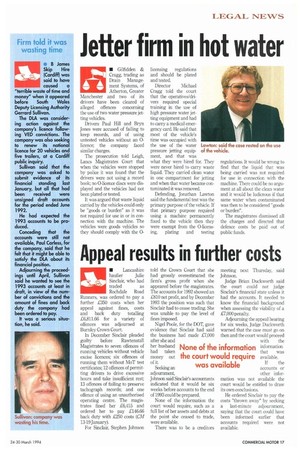Appeal results in further costs
Page 21

If you've noticed an error in this article please click here to report it so we can fix it.
• Lancashire haulier Julie Sinclair, who had traded as Rochdale Road Runners, was ordered to pay a further 1350 costs when her appeal against fines, costs and back duty totalling £6,811.66 for a variety of offences was adjourned at Burnley Crown Court.
In December Sinclair pleaded guilty before Rawtenstall Magistrates to seven offences of running vehicles without vehicle excise licences; six offences of running them without MoT test certificates; 12 offences of permitting drivers to drive excessive hours and take insufficient rest; 13 offences of failing to preserve tachograph records; and one offence of using an unauthorised operating centre. The magistrates fined her £6,415 and ordered her to pay £146.66 back duty with £250 costs (CM 13-19 January),
For Sinclair, Stephen Johnson told the Crown Court that she had grossly overestimated the firm's gross profit when she appeared before the magistrates The accounts for 1992 showed an £810 net profit, and by December 1993 the position was such that Sinclair had to cease trading. She was unable to pay the level of fines imposed.
Nigel Poole, for the DOT, gave evidence that Sinclair had said the business had made £7,000 after she and her husband had taken money out of it.
Seeking an adjournment, Johnson said Sinclair 's accountants indicated that it would be six weeks before accounts to the end of 1993 could be prepared.
None of the information the court would require, such as a full list of her assets and debts at the point she ceased to trade, were available.
There was to be a creditors meeting next Thursday, said Johnson.
Judge Brian Duckworth said the court could not judge Sinclair's financial state unless it had the accounts. It needed to know the financial background when assessing the viability of a £7,000 penalty
Adjourning the appeal hearing for six weeks, Judge Duckworth warned that the case must go on then and the court would proceed with the information that was available.
If the accounts or other information was not available the court would be entitled to draw its own conclusions.
He ordered Sinclair to pay the costs "thrown away" by seeking a last-minute adjournment, saying that the court could have been informed earlier that accounts required were not available.
































































































